Intel Core i7-10700 vs Core i7-10700K Review: Is 65W Comet Lake an Option?
by Dr. Ian Cutress on January 21, 2021 10:30 AM EST- Posted in
- CPUs
- Intel
- Core i7
- Z490
- 10th Gen Core
- Comet Lake
- i7-10700K
- i7-10700
CPU Tests: Legacy and Web
In order to gather data to compare with older benchmarks, we are still keeping a number of tests under our ‘legacy’ section. This includes all the former major versions of CineBench (R15, R11.5, R10) as well as x264 HD 3.0 and the first very naïve version of 3DPM v2.1. We won’t be transferring the data over from the old testing into Bench, otherwise it would be populated with 200 CPUs with only one data point, so it will fill up as we test more CPUs like the others.
The other section here is our web tests.
Web Tests: Kraken, Octane, and Speedometer
Benchmarking using web tools is always a bit difficult. Browsers change almost daily, and the way the web is used changes even quicker. While there is some scope for advanced computational based benchmarks, most users care about responsiveness, which requires a strong back-end to work quickly to provide on the front-end. The benchmarks we chose for our web tests are essentially industry standards – at least once upon a time.
It should be noted that for each test, the browser is closed and re-opened a new with a fresh cache. We use a fixed Chromium version for our tests with the update capabilities removed to ensure consistency.
Mozilla Kraken 1.1
Kraken is a 2010 benchmark from Mozilla and does a series of JavaScript tests. These tests are a little more involved than previous tests, looking at artificial intelligence, audio manipulation, image manipulation, json parsing, and cryptographic functions. The benchmark starts with an initial download of data for the audio and imaging, and then runs through 10 times giving a timed result.
We loop through the 10-run test four times (so that’s a total of 40 runs), and average the four end-results. The result is given as time to complete the test, and we’re reaching a slow asymptotic limit with regards the highest IPC processors.

Google Octane 2.0
Our second test is also JavaScript based, but uses a lot more variation of newer JS techniques, such as object-oriented programming, kernel simulation, object creation/destruction, garbage collection, array manipulations, compiler latency and code execution.
Octane was developed after the discontinuation of other tests, with the goal of being more web-like than previous tests. It has been a popular benchmark, making it an obvious target for optimizations in the JavaScript engines. Ultimately it was retired in early 2017 due to this, although it is still widely used as a tool to determine general CPU performance in a number of web tasks.
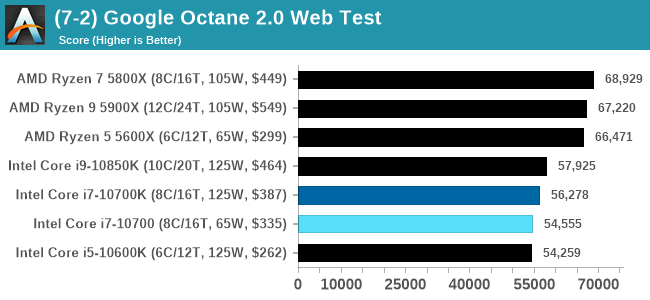
Speedometer 2: JavaScript Frameworks
Our newest web test is Speedometer 2, which is a test over a series of JavaScript frameworks to do three simple things: built a list, enable each item in the list, and remove the list. All the frameworks implement the same visual cues, but obviously apply them from different coding angles.
Our test goes through the list of frameworks, and produces a final score indicative of ‘rpm’, one of the benchmarks internal metrics.
We repeat over the benchmark for a dozen loops, taking the average of the last five.
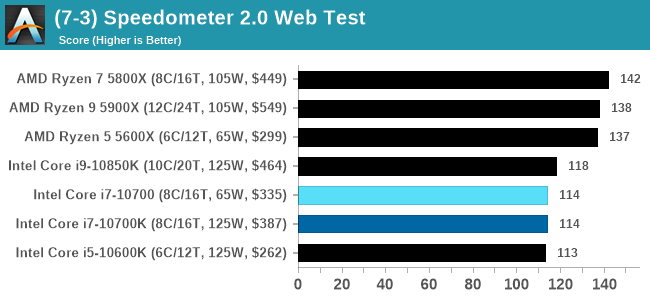
Legacy Tests
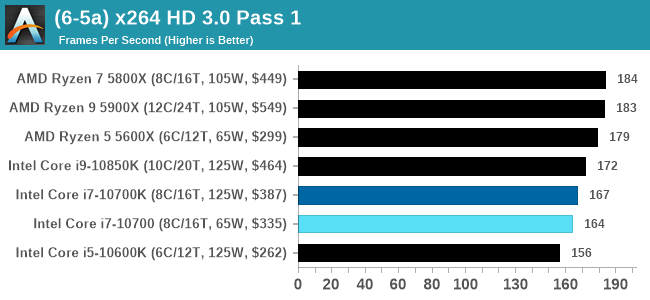
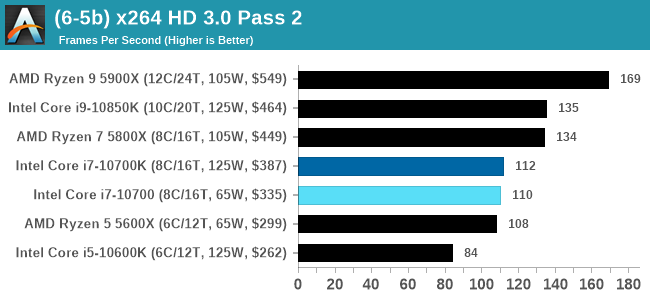
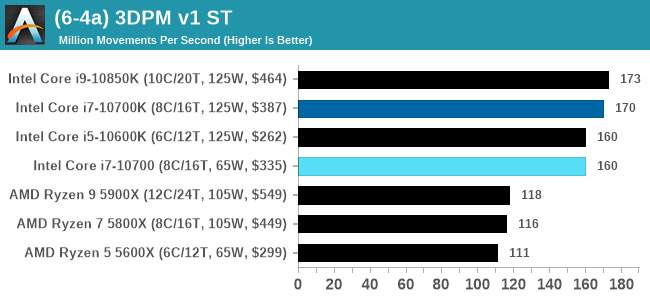
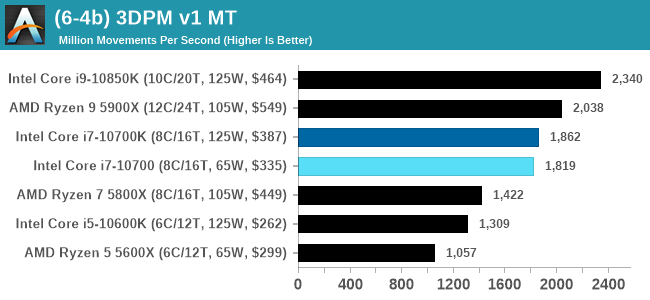
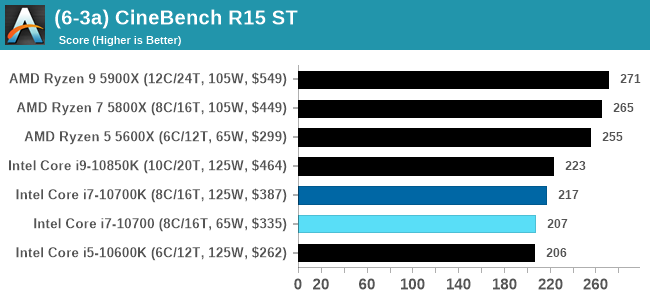
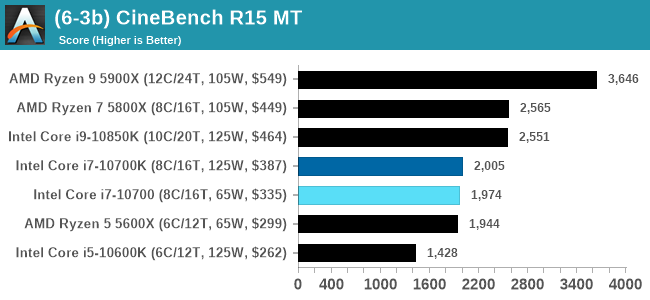


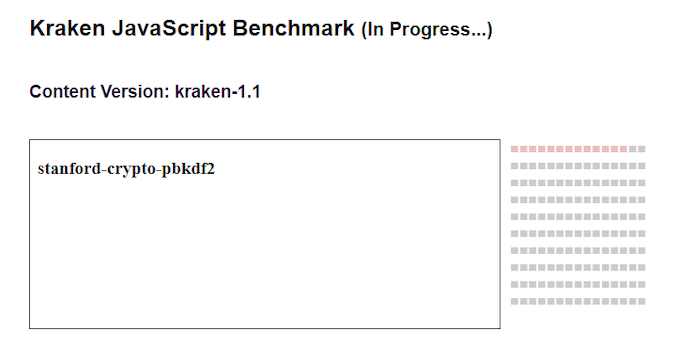
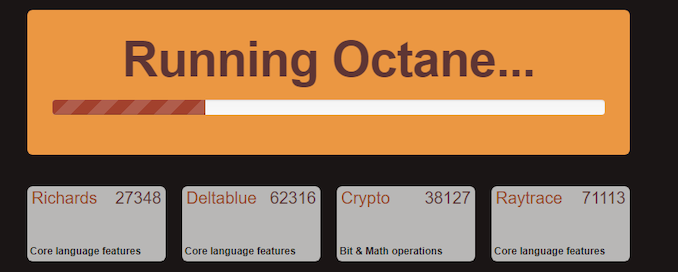
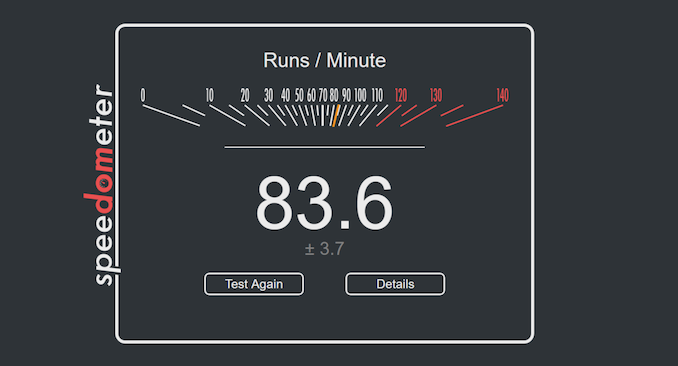








210 Comments
View All Comments
sjkpublic@gmail.com - Friday, January 22, 2021 - link
Yes. There is an issue with power consumption. And that is a lead into the real story. Intel has been at 14nm for 3 years now. Historically that time frame is unheard of. Some may say the complexity of the Intel CPU die is partly to blame. Some may say it is no wonder that Apple went to M1. Everyone will say Intel has dropped the ball.DieselPunk - Saturday, January 23, 2021 - link
Wow, here's a shock. Modern games get very little difference from CPUs as they are all GPU bound. And a good high end GPU is going to burn far more coal than a CPU ever will.As a gamer, WTF do I care about CPU power usage for? When I run out of coal there is still lots of gasoline 😎
headmaster - Saturday, January 23, 2021 - link
it's a great post admin thanks for ithttps://www.snapseedforpcguide.co/
yankeeDDL - Saturday, January 23, 2021 - link
Is it fair to say that the 10700 is on par (at best) or slower (in most multi-threaded scenarios) than the Ryzen 5600X, despite using roughly 2X the power?Makste - Saturday, January 23, 2021 - link
Put the number of cores into consideration as another factor, and then come up with your own conclusion.HarkPtooie - Sunday, January 24, 2021 - link
I registered just to post this: you're nuts.I just measured my "65W" i7-10700 non-K while stress testing it, and it eats 165 W at the wall plug. 64GB RAM, good quality Corsair 450W PSU.
Then I compared to to my "65W" Ryzen 3700X, 32GB RAM = 157 W. That one has an expensive fanless Seasonic 500W PSU which nominally better efficiency at these power draw levels.
So the difference is 10W and may as well be attributed to PSU quality, RAM consumption and whatnot.
If you are going to make wild speculations whose veracity anyone can check, you might want to go over your material a bit better.
Smell This - Sunday, January 24, 2021 - link
LOL
mmm ... Let me see.
Three feature writers at AT versus some 'anecdotal' FUD-peddling troll on the Internet. The Universe will make the call.
The 65w 8c/16t AMD Ryzen 3700X, fully loaded, pulls 90w. There is also a fancy multi-colored chart for you!
https://www.anandtech.com/show/14605/the-and-ryzen...
The i7-10700, in this article, pulls 197w to 214w. Ooops.
Psssst ___ By the way, my local MicroCenter (Duluth) offers the AMD Ryzen 3700X at $299 after $30 off, and the i7-10700 for $280 after $120 off. My-my-my, how the mighty has fallen . . .
HarkPtooie - Tuesday, January 26, 2021 - link
So you are saying that their wattmeters are right and mine is wrong because... appeal to authority?It may be that my Ryzen draws 90 W, but from the looks of it, the i7 is not far off. 10 more watts, not 130.
The universe will indeed make the call.
Spunjji - Wednesday, January 27, 2021 - link
Plausible explanations for the discrepancy, in order of likelihood:1) The unspecified stress test you're using isn't actually stressing the 10700 very heavily.
2) You're not measuring like-for-like in some other way - be it components or configuration.
3) Your wattmeter is poorly calibrated (This level would be a reach).
4) You're simply not being honest (I don't like to assume this, but you seem aggressive about people questioning your implausible conclusions).
Implausible explanations:
1) Every review on the internet performed with calibrated equipment, specified configurations and specified software loads is somehow wrong and you are right.
Everett F Sargent - Wednesday, January 27, 2021 - link
I'll go as far as requiring/requesting/asking for their MB model (an exact model number and manufacturer thereof). Without that one key piece of information, I have concluded the following: Using a Z490 or other relatively high end LGA 1200 MB indicates that the i7-10700 will run at or significantly above 200W in continuous 247 operation.Remember this user claims to be using a 450W PSU, so very likely not a Z490 MB, so indicative of a rather low end system (e. g. no medium to high end GPU, not that that matters as these are essentially CPU tests unless stated otherwise in this review).
I believe their power number but I don't believe that they are testing on a medium to high end LGA 1200 MB. In other words it is all about the MB default settings for PL1, PL2 and Tau and not the CPU itself.